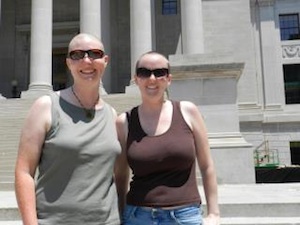
“Our hair can grow back,” environmental activist Vivian Stockman told me yesterday. “The mountains can’t.”
Last week, Stockman joined twenty other West Virginia women (and a few men) in silently shaving their heads at the West Virginia state capital. This week, seven more joined them at a protest in DC. To Stockman, they are acts of mourning – “deeply personal” sacrificial actions symbolic of the pain that mountain top removal has brought to Appalachian communities.
West Virginians are no strangers to sacrifice. Author Denise Giardinia wrote after the 2010 Upper Big Branch mining disaster that West Virginia, my home state, has long been a “national sacrifice area.” The health, safety, and environmental risks to mining communities have often been overshadowed by the fact that the rest of the country relies on the coal that comes from the region.
So now, women from West Virginia are making visible that sense of sacrifice – with their bodies.
The idea belonged to Marilyn Mullens who said that it came to her in a night of restless sleep. Mullens explained that she wanted to lead a tribute to the hundreds of mountains and thousands of communities that have been damaged or destroyed by mountaintop removal coal mining. “We’ve gone through all the official channels of every level of our state government,” she said. “We’ve been to DC. Nothing is being done.”
Mullens pointed out that we live in a culture in which hair is deeply important to many people, especially women. By removing hers, she is standing in solidarity both with the mountains that have been blown up and with the people in mining communities who have lost their health. Mullens, who is from Southern West Virginia, knows the human effects of mountaintop removal coal mining firsthand. Her community has been flooded multiple times (mountaintop removal can lead to increased erosion), and the foundation of her home has been badly damaged.
There is an Appalachian saying that what you do to the land, you do to the people. And it’s true – just ask people living near mountaintop mining who face cancer rates of almost 15% (compared to the 9.4% for other parts of Appalachia).
Or ask the parents of the five-year-old girl whose photo recently caused such a stir in a subcommittee of the House of Representatives Committee on Natural Resources. The photo, submitted by award-winning environmental activist Marie Gunnoe, depicts a child in a bathtub full of brown tap water. Gunnoe was clearly trying to show the health impacts on communities near West Virginia mountaintop removal sites. It is a photo that everyone in the country should see.
But the photo was not allowed to be shown at the hearing, and afterwards Gunnoe was pulled into a side room and questioned by the U.S. Capitol Police for nearly an hour on suspicion of child pornography.
As Aaron Bady wrote in the Huffington Post, the real obscenity is not the photo of a child bathing – it’s that the communities have no choice but to bathe their children in polluted water.
Denise Giardinia was right when she wrote that West Virginia is a national sacrifice area. But women in West Virginia are coming together to hold up photos, shave off their hair, and make people look at what kind of sacrifice is happening. What you do to the land, you do to the people – but the people can organize.
For information on how to get involved, check out the Ohio Valley Environmental Coalition
(Photo Credit: Between the Lines)